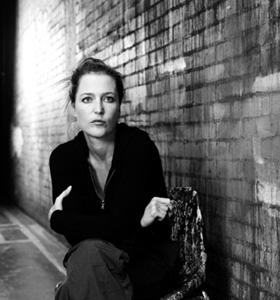
25
March 2004 - 15 May 2004 Evening Performances: Monday - Saturday 7.30pm Saturday Matinees: 3, 10, 17, 24 April, 1, 8 and 15 May 3.30pm Mid-Week Matinees: 29 April 3.30pm Royal Court Theatre Back to GA.ws |

|
Theatre: The Sweetest Swing in Baseball By Alastair Macaulay Financial Times April 1 2004 18:09 Gillian Anderson - to my surprise - has returned to the British stage, and at first seems to have broken through into something close to greatness. When she appeared in What the Night Was For in 2002-03, I assumed she was just slotting a once-only West End season into her CV as so many transatlantic stars have done. But no. The star of the X Files is back. And during the first few scenes of Rebecca Gilman's new play, you watch her with your heart in your mouth. She plays Dana, a painter, who goes through trauma and attempted suicide; she's tough, intelligent, defensive. And Anderson is luminous. She can seem overwrought without moving a muscle, as if her raw nerves were all exposed. Gilman's writing in these scenes is excellent, and, when Dana goes to a psychiatric hospital and starts to speak about drawing to a fellow-patient, we have some of the most psychologically suggestive writing about the practice of art since Pinter's Landscape. But then the play shrinks into near-farce. To stay in hospital, Dana pretends she thinks she's the baseball player Darryl Strawberry. Sure, Gilman takes us through this into something larger: her Darryl persona both liberates Dana as a painter and traps her as a person. The play is a psychological suspense story. But that's not how most of it feels: the Dana/Darryl character makes it more like Tootsie - the Dustin Hoffmann movie about an actor playing a woman to get work - only in gender-reverse and without the laughs. We stop watching the anguished Dana with concern. Too bad. I watched the opening scenes with excitement: Anderson seemed to have the material of a true Hedda Gabler. After her unaffecting performance in What The Night Is For , I guessed the difference was due to director Ian Rickson, who stages the play with classical austerity. Anderson's technique is, at first, irradiated by a pained, frozen, intensity and her eyes draw you in even more than her voice. Sometimes tear-filled, they're often on the verge of passive-aggressive reproachfulness, but they're also wary, feverish, always bright with a misery she never releases. Once she starts playing at being Darryl, something in those eyes dims. Then, as in What the Night, there's the problem that she can't make her vocal timbre affecting: it's a covered voice, reined-in, withdrawn even in spontaneous fun. As an actress, she no longer seems an android but in a play that lets her go off-stage for less than three minutes during 130 minutes, she isn't yet the kind of human being who can involve you throughout. She can claim your heart, but she can't keep it. |